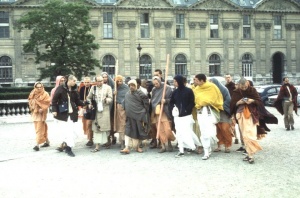SB 3.8.24: Difference between revisions
m (1 revision(s)) |
No edit summary |
||
| Line 1: | Line 1: | ||
{{info | {{info | ||
|speaker=Maitreya | |speaker=Maitreya Ṛṣi | ||
|listener=Vidura | |listener=Vidura | ||
}} | }} | ||
[[Category:Srimad-Bhagavatam - Canto 03 Chapter 08]] | |||
[[Category:Bhagavatam Verses Spoken by Maitreya Rsi - Vanisource|030824]] | |||
<div style="float:left">'''[[Srimad-Bhagavatam]] - [[SB 3|Third Canto]] - [[SB 3.8: Manifestation of Brahma from Garbhodakasayi Visnu|Chapter 8: Manifestation of Brahmā from Garbhodakaśāyī Viṣṇu]]'''</div> | |||
<div style="float:right">[[File:Go-previous.png|link=SB 3.8.23]] '''[[SB 3.8.23]] - [[SB 3.8.25]]''' [[File:Go-next.png|link=SB 3.8.25]]</div> | |||
{{RandomImage}} | |||
==== TEXT 24 ==== | ==== TEXT 24 ==== | ||
<div | <div class="verse"> | ||
prekṣāṁ kṣipantaṁ haritopalādreḥ | :prekṣāṁ kṣipantaṁ haritopalādreḥ | ||
sandhyābhra-nīver uru-rukma-mūrdhnaḥ | :sandhyābhra-nīver uru-rukma-mūrdhnaḥ | ||
ratnodadhārauṣadhi-saumanasya | :ratnodadhārauṣadhi-saumanasya | ||
vana-srajo veṇu-bhujāṅghripāṅghreḥ | :vana-srajo veṇu-bhujāṅghripāṅghreḥ | ||
</div> | </div> | ||
| Line 16: | Line 22: | ||
==== SYNONYMS ==== | ==== SYNONYMS ==== | ||
<div | <div class="synonyms"> | ||
''prekṣām''—the panorama; ''kṣipantam''—deriding; ''harita''—green; ''upala''—coral; ''adreḥ''—of the hell; ''sandhyā-abhra-nīveḥ''—of the dress of the evening sky; ''uru''—great; ''rukma''—gold; ''mūrdhnaḥ''—on the summit; ''ratna''—jewels; ''udadhāra''—waterfalls; ''auṣadhi''—herbs; ''saumanasya''—of the scenery; ''vana-srajaḥ''—flower garland; ''veṇu''—dress; ''bhuja''—hands; ''aṅghripa''—trees; ''aṅghreḥ''—legs. | |||
</div> | </div> | ||
| Line 23: | Line 29: | ||
==== TRANSLATION ==== | ==== TRANSLATION ==== | ||
<div | <div class="translation"> | ||
The luster of the transcendental body of the Lord mocked the beauty of the coral mountain. The coral mountain is very beautifully dressed by the evening sky, but the yellow dress of the Lord mocked its beauty. There is gold on the summit of the mountain, but the Lord's helmet, bedecked with jewels, mocked it. The mountain's waterfalls, herbs, etc., with a panorama of flowers, seem like garlands, but the Lord's gigantic body, and His hands and legs, decorated with jewels, pearls, tulasī leaves and flower garlands, mocked the scene on the mountain. | The luster of the transcendental body of the Lord mocked the beauty of the coral mountain. The coral mountain is very beautifully dressed by the evening sky, but the yellow dress of the Lord mocked its beauty. There is gold on the summit of the mountain, but the Lord's helmet, bedecked with jewels, mocked it. The mountain's waterfalls, herbs, etc., with a panorama of flowers, seem like garlands, but the Lord's gigantic body, and His hands and legs, decorated with jewels, pearls, tulasī leaves and flower garlands, mocked the scene on the mountain. | ||
</div> | </div> | ||
| Line 30: | Line 36: | ||
==== PURPORT ==== | ==== PURPORT ==== | ||
<div | <div class="purport"> | ||
The panoramic beauty of nature, which strikes one with wonder, may be taken as a perverted reflection of the transcendental body of the Lord. One who is therefore attracted by the beauty of the Lord is no longer attracted by the beauty of material nature, although he does not minimize its beauty. In Bhagavad-gītā ([[BG 2.59]]) it is described that one who is attracted by param, the Supreme, is no longer attracted by anything inferior. | The panoramic beauty of nature, which strikes one with wonder, may be taken as a perverted reflection of the transcendental body of the Lord. One who is therefore attracted by the beauty of the Lord is no longer attracted by the beauty of material nature, although he does not minimize its beauty. In [[Bhagavad-gita As It Is (1972)|''Bhagavad-gītā'']] ([[BG 2.59 (1972)|BG 2.59]]) it is described that one who is attracted by ''param'', the Supreme, is no longer attracted by anything inferior. | ||
</div> | </div> | ||
__NOTOC__ | |||
<div style="float:right; clear:both;">[[File:Go-previous.png|link=SB 3.8.23]] '''[[SB 3.8.23]] - [[SB 3.8.25]]''' [[File:Go-next.png|link=SB 3.8.25]]</div> | |||
__NOTOC__ | |||
__NOEDITSECTION__ | |||
Revision as of 16:06, 4 May 2021

A.C. Bhaktivedanta Swami Prabhupada
TEXT 24
- prekṣāṁ kṣipantaṁ haritopalādreḥ
- sandhyābhra-nīver uru-rukma-mūrdhnaḥ
- ratnodadhārauṣadhi-saumanasya
- vana-srajo veṇu-bhujāṅghripāṅghreḥ
SYNONYMS
prekṣām—the panorama; kṣipantam—deriding; harita—green; upala—coral; adreḥ—of the hell; sandhyā-abhra-nīveḥ—of the dress of the evening sky; uru—great; rukma—gold; mūrdhnaḥ—on the summit; ratna—jewels; udadhāra—waterfalls; auṣadhi—herbs; saumanasya—of the scenery; vana-srajaḥ—flower garland; veṇu—dress; bhuja—hands; aṅghripa—trees; aṅghreḥ—legs.
TRANSLATION
The luster of the transcendental body of the Lord mocked the beauty of the coral mountain. The coral mountain is very beautifully dressed by the evening sky, but the yellow dress of the Lord mocked its beauty. There is gold on the summit of the mountain, but the Lord's helmet, bedecked with jewels, mocked it. The mountain's waterfalls, herbs, etc., with a panorama of flowers, seem like garlands, but the Lord's gigantic body, and His hands and legs, decorated with jewels, pearls, tulasī leaves and flower garlands, mocked the scene on the mountain.
PURPORT
The panoramic beauty of nature, which strikes one with wonder, may be taken as a perverted reflection of the transcendental body of the Lord. One who is therefore attracted by the beauty of the Lord is no longer attracted by the beauty of material nature, although he does not minimize its beauty. In Bhagavad-gītā (BG 2.59) it is described that one who is attracted by param, the Supreme, is no longer attracted by anything inferior.